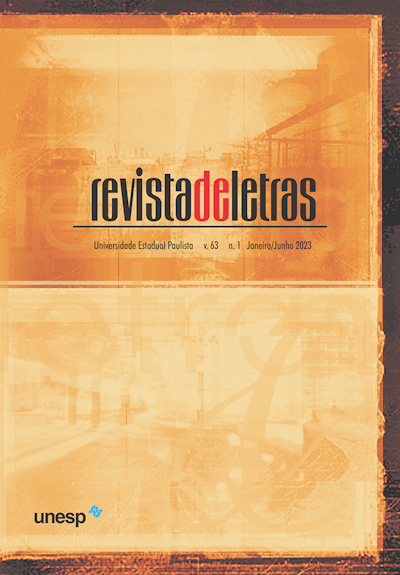Current Issue
Full Issue
Varia
Semi-annual publication | print ISSN 0101-3505 | e-ISSN 1981-7886
Online Submission: click here
Call for Paper
Possibilities of the Uncanny in Fiction
Deadline for contributions: 29 July 2016
In the last years, national and international academic interest and research on the various manifestations of the Uncanny in fiction – Fantastic, Gothic, Fantasy, Marvelous, Magical Realism, Science Fiction, Steampunk, Cyberpunk, among many other denominations, including the Uncanny itself understood as a means of fiction per se – have been largely increasing, and some of its branches have already established themselves as specific research fields, like the Gothic and the Fantastic.
This number of Revista de Letras will try to better comprehend this phenomenon by accepting articles that specifically or comparatively approach one or several of the many possibilities of the Uncanny in fiction, being it manifested either in literature or in related arts to literature (cinema, theater, TV, graphic novel, music, etc.).
Shakespeare: (re)inventing the literary
Deadline for contributions: 29 July 2016
In 2016 it is commemorated the 400th anniversary of Shakespeare’s death, and it is certain that, in these four centuries, he and his works turned into watersheds in Western literature and many things have been said, unsaid and resaid about his legacy and his personality by and among the reading public – being ‘reading public’ understood as the common reader and the academic reader at the same time. It is also certain that Shakespeare (re)invented and keeps (re)inventing the literary under many perspectives: we read Shakespeare on the printed book, in comic strips, on graphic novels, on internet; we now watch Shakespeare in theater, in the cinema, on TV and on YouTube; we listen to Shakespeare in mp3 archives and in audiobooks; we interact with Shakespeare in his personal profiles (fictitious ones?) on Facebook; we rewrite Shakespeare; we even play with Shakespeare on videogames and on online games.
This number of Revista de Letras will accept articles that approach any of the several ways by which Shakespeare’s works remain alive and permanently (re)inventing the literary through literature itself and literary theory and criticism, through related arts to literature (theater, cinema, TV, graphic novel, music, etc.), through comparative studies, and through culture.

